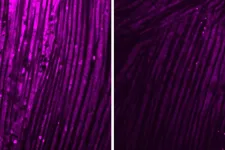(Press-News.org) Systems designed to treat arsenic in private well water may be malfunctioning and endangering the health of people who count on them to keep their water safe, according to Rutgers researchers.
Megan Rockafellow-Baldoni, an assistant professor of environmental and occupational health and justice at the Rutgers School of Public Health, together with co-authors including Rutgers alum Steven Spayd, a retired research scientist formerly with the New Jersey Department of Environmental Protection, tested the water of 62 New Jersey homes with whole-house arsenic-removing water treatment systems. Their study was published in the journal Water Environment Research.
Spayd said "these water treatment systems may be solving one exposure problem by removing dissolved arsenic from the water, but potentially creating a new exposure, the ingestion of arsenic treatment media with high concentrations of arsenic.”
While arsenic is a naturally occurring element, it is a known human carcinogen and dangerous to human health. For this reason, when New Jersey homes with wells are sold, it is required they are tested for arsenic. If the element is found above safe levels for drinking water, an arsenic treatment system can be installed.
In such treatment systems, water from the well flows through a specialized adsorptive filter. When the system functions as intended, the adsorptive media and the filtered arsenic are left behind in the treatment tank while potable water flows into the home.
However, Rockafellow-Baldoni and co-authors of the study found microparticles of arsenic treatment media in the drinking water at 71 percent of the tested homes. This media is intended to remain within the treatment tank and never enter a home’s drinking water as it likely contains high concentrations of adsorbed arsenic.
Arsenic may not be the only contaminant of concern: When radium, another naturally occurring yet hazardous substance, is detected in well water, it is effectively removed with a water softener.
Through the course of their research, Rockafellow-Baldoni and Spayd detected microparticles of water softener resin in 84 percent of the homes with water softeners, suggesting that in some homes, microparticles with adsorbed radium might also be present.
They added that further research is needed to determine the reason for malfunction and determine the arsenic and radium concentrations in the escaping media.
Until the problem can be further studied and resolved, the researchers encourage well owners install a 5-micron post-treatment sediment filter to capture escaping media. Information about obtaining and properly installing the filter is available from the New Jersey Geological and Water Survey.
END
Rutgers researchers spot potential hazard with private well water treatment
Microparticles of arsenic treatment media and water softener resin are detected in drinking water
2024-07-12
ELSE PRESS RELEASES FROM THIS DATE:
When to trust an AI model
2024-07-12
CAMBRIDGE, MA – Because machine-learning models can give false predictions, researchers often equip them with the ability to tell a user how confident they are about a certain decision. This is especially important in high-stake settings, such as when models are used to help identify disease in medical images or filter job applications.
But a model’s uncertainty quantifications are only useful if they are accurate. If a model says it is 49% confident that a medical image shows a pleural effusion, then 49% of the time, the model should be right.
MIT ...
Research shows gamified investment sites have risks for novice investors
2024-07-12
TORONTO - What happens when online investment trading platforms start to resemble games that keep people playing for hours, with badges and exploding confetti to reward investors for their engagement?
For those who know what they’re doing, it won’t make much of a difference. New research from the University of Toronto engaging nearly 1,000 volunteers in artificial investment scenarios shows that more informational features such as price change notifications might even help savvy investors execute ...
Specially equipped natural killer cells show effectiveness against the most common form of ovarian cancer
2024-07-12
RESEARCH SUMMARY
Study Title: CAR memory-like NK cells targeting the membrane proximal domain of mesothelin demonstrate promising activity in ovarian cancer
Publication: Science Advances
Dana-Farber Cancer Institute authors include: Rizwan Romee, MD, senior author; and Mubin Tarannum, PhD, KhanhLinh Dinh, and Juliana Vergara, MD, MMSc, co-first authors
Summary: Natural killer, or NK, cells endowed with memory-like abilities and armed with a novel chimeric antigen receptor (CAR) have generated encouraging results in experiments in epithelial ovarian cancer ...
Entering the golden age for antibody-drug conjugates in gynecologic cancer
2024-07-12
“We are optimistic that the incorporation of ADCs into the treatment of aggressive tumors and treatment refractory gynecologic cancers will improve quality of life and survival outcomes in our patients.”
BUFFALO, NY- July 12, 2024 – A new editorial paper was published in Oncoscience (Volume 11) on May 20, 2024, entitled, “Entering the golden age for antibody-drug conjugates in gynecologic cancer.”
In this new editorial, researchers Michelle Greenman, Blair McNamara, Levent Mutlu, and Alessandro D. Santin from Yale University School of Medicine discuss gynecologic cancers. Biologically aggressive ...
Judge: Texas university must release records on research study that resulted in deaths of dozens of animals
2024-07-12
SAN ANGELO, Texas —Tom Green County District Court Judge Barbara L. Walther ruled Thursday, July 11, 2024, that Angelo State University must release public records relating to an experiment conducted on dozens of mice that resulted in the animals’ unnecessary suffering and death, reportedly to study the impact of the foster care system on human children.
The ruling overturns Texas Attorney General Ken Paxton’s Nov. 17, 2022 decision to side with the university in denying the records.
On July 13, 2023, the Physicians Committee for Responsible Medicine, a Washington, D.C. based health advocacy group of more than 17,000 doctor members that encourages higher standards ...
UMass Amherst food scientist rises to the challenge of giving marbled fatty feel and taste to plant-based meat
2024-07-12
One of the challenges of creating realistic-looking and delectable plant-based meat is mimicking the marbled effect of animal fat that many carnivores expect and enjoy.
A University of Massachusetts Amherst food scientist has a plan to tackle this quandary by developing new technology supported by a $250,000 grant from the Good Food Institute. The not-for-profit think tank promotes plant-based alternatives to meat, dairy and eggs, as well as cultivated “clean meat” grown from animal cells in a facility.
The technology proposed ...
Complex impact of large wildfires on ozone layer dynamics unveiled by new study
2024-07-12
In a revelation that highlights the fragile balance of our planet's atmosphere, scientists from China, Germany, and the USA have uncovered an unexpected link between massive wildfire events and the chemistry of the ozone layer. Published in Science Advances, this study reveals how wildfires, such as the catastrophic 2019/20 Australian bushfires, impact the stratosphere in previously unseen ways.
The ozone layer, a crucial shield protecting life on Earth from harmful ultraviolet (UV) radiation, has been on a path to ...
Brain inflammation triggers muscle weakness after infections
2024-07-12
Infections and neurodegenerative diseases cause inflammation in the brain. But for unknown reasons, patients with brain inflammation often develop muscle problems that seem to be independent of the central nervous system. Now, researchers at Washington University School of Medicine in St. Louis have revealed how brain inflammation releases a specific protein that travels from the brain to the muscles and causes a loss of muscle function.
The study, in fruit flies and mice, also identified ways to block this process, which could have ...
Research alert: All stem cell therapies are not created equal
2024-07-12
Researchers from University of California San Diego have found that two of the most frequently administered stem cell therapies, which are often used interchangeably, actually contain completely different types of cells. The results challenge the current “one-cell-cures-all” paradigm in orthopedic stem cell therapeutics and highlight the need for more informed and rigorous characterization of injectable stem cell therapies before they are marketed for use in patients.
The researchers analyzed cell populations of autologous bone marrow aspirate concentrate (BMAC) and adipose-derived ...
Complex impact of large wildfires on ozone layer dynamics
2024-07-12
The ozone layer, a crucial shield protecting life on Earth from harmful ultraviolet (UV) radiation, has been on a path to recovery thanks to the Montreal Protocol. This landmark international treaty, adopted in 1987, successfully led to phasing out the production of numerous substances responsible for ozone depletion. Over the past decades, the ozone layer has shown significant signs of healing, a testament to global cooperation and environmental policy.
However, the stability of this vital atmospheric layer is now facing a new and unexpected challenge. During the 2019/20 Australian wildfires, ...
LAST 30 PRESS RELEASES:
Stem cells from human baby teeth show promise for treating cerebral palsy
Chimps’ love for crystals could help us understand our own ancestors’ fascination with these stones
Vaginal estrogen therapy not linked to cancer recurrence in survivors of endometrial cancer
How estrogen helps protect women from high blood pressure
Breaking the efficiency barrier: Researchers propose multi-stage solar system to harness the full spectrum
A new name, a new beginning: Building a green energy future together
From algorithms to atoms: How artificial intelligence is accelerating the discovery of next-generation energy materials
Loneliness linked to fear of embarrassment: teen research
New MOH–NUS Fellowship launched to strengthen everyday ethics in Singapore’s healthcare sector
Sungkyunkwan University researchers develop next-generation transparent electrode without rare metal indium
What's going on inside quantum computers?: New method simplifies process tomography
This ancient plant-eater had a twisted jaw and sideways-facing teeth
Jackdaw chicks listen to adults to learn about predators
Toxic algal bloom has taken a heavy toll on mental health
Beyond silicon: SKKU team presents Indium Selenide roadmap for ultra-low-power AI and quantum computing
Sugar comforts newborn babies during painful procedures
Pollen exposure linked to poorer exam results taken at the end of secondary school
7 hours 18 mins may be optimal sleep length for avoiding type 2 diabetes precursor
Around 6 deaths a year linked to clubbing in the UK
Children’s development set back years by Covid lockdowns, study reveals
Four decades of data give unique insight into the Sun’s inner life
Urban trees can absorb more CO₂ than cars emit during summer
Fund for Science and Technology awards $15 million to Scripps Oceanography
New NIH grant advances Lupus protein research
New farm-scale biochar system could cut agricultural emissions by 75 percent while removing carbon from the atmosphere
From herbal waste to high performance clean water material: Turning traditional medicine residues into powerful biochar
New sulfur-iron biochar shows powerful ability to lock up arsenic and cadmium in contaminated soils
AI-driven chart review accurately identifies potential rare disease trial participants in new study
Paleontologist Stephen Chester and colleagues reveal new clues about early primate evolution
UF research finds a gentler way to treat aggressive gum disease
[Press-News.org] Rutgers researchers spot potential hazard with private well water treatmentMicroparticles of arsenic treatment media and water softener resin are detected in drinking water


